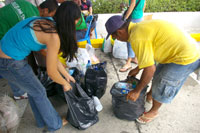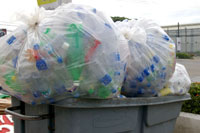Segregate that waste!
SM City Iloilo, DENR spearhead Waste Market Fair

Tetra packs recycled into wallets
There are many reasons why we should recycle. According to the Solid Waste Management Association of the Philippines (SWAPP), they are: To save trees, protect wildlife habitat and biodiversity, lower the use of toxic chemicals, help curb global warming, stems the flow of water pollution, reduces the need for landfills, reduces the need for incinerators, creates jobs and promotes economic development, city to profit from selling recyclables and buying recycled products contributes to the demand for more of such.
These are the reasons why SM City Iloilo and the Department of Environment and Natural Resources (DENR) launched the Waste Market Fair last June 30, 2007 at the former's parking area.

Buyers receive recycled materials
from sellers
"This is the first ever waste market fair in Iloilo. To help in the preserving of our environment, we started in our own backyard --- in our mall. We have started to segregate the solid waste of our tenants. We are using waste water for our cooling towers. We are using waterless urinals. We hope to create a ripple effect. We started with our tenants; we can start with our clients as well. Together, we can make a difference," said Ma. Majella Liboon, SM City Iloilo manager.
Tony Chiong of the NSWM said that 40 to 45 percent of wastes are recyclable. "If we are doing enough effort to recycle, we are only throwing away less than 10 percent in the dumpsite."
Amelita Aguinaldo, deputy commissioner of the National Solid Waste Management cited statistics on what recycling can do. She said that P2.5 million was earned from selling recyclables; 164,000 kilos of harmful lead were recovered; 2,721 trees were protected; 32,857 liters of sulphuric acid treated and 11,867 toxic materials treated, among others. She added that some 1,490 cubic meters of landfill space was avoided.

A collection of mineral water contianers
The law requires that 25 percent of wastes be diverted and the local government unit has to implement this.
Marissa Segovia, an advocate on the protection of the environment, admits that messages like these take time to deliver. "Invite friends and families in events like this. We also have to get into that habit of segregating and recycling at source," she said.
She revealed that a recyclers group in the Calajunan dumpsite will be put up. Its first products would be recycled wallets, bags, notebook covers with notebook inside, envelopes and shopping bags.
Aguinaldo said that the DENR targets a level of one percent for hazardous waste and four percent for residual waste that will be managed in the future.
"Segregate your wastes," she reiterated.
